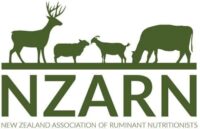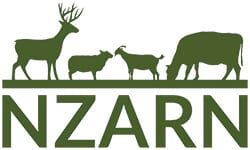Search results...
NZARN is proud to announce Biomin as an annual sponsor
NZARN are very grateful for the support of Biomin.
Understanding and mitigating heat stress in NZ dairy cows – Kirsty Verhoek
Kirsty gave an overview of heat stress, measuring and mitigating heat stress and the new research in heat stress within NZ. In the summer of 2023 Dairy NZ carried out a trial reviewing heat stress, and while this was one of the wettest summer in over a decade, there was significant data including high wind
Farm systems and driving revenue – Pip Gale
Pip starts the session by outlining some key factors that we need to reach broad agreement about with regard to dairy productivity and profitability. “Can we agree that”…. 1) The three bottom lines of animal welfare, environmental and economic sustainability are created by the management of biological production systems. 2) Cutting all costs contravenes point
Transition Feeding – Sue Macky
Sue Macky discussed the challenges she has come across and highlights areas to focus on during transition feeding in an interactive session. She bounces from nutritional aspects to animal behaviour and cow comfort, to the animal health challenges. Sharing the key components, she looks at and emphasises the importance of going back to basics and
Using Minda data to diagnose opportunities for reproductive improvement – Jair Mandriaza
Jair showcased the latest in the LIC statistics for the 2023/24 season. These results where compared against previous years with discussions looking at the use of wearable and none wearable herds. The data set outlined the national ranking, with cows split out into top quartile, 2nd 3rd and bottom, reviewing 6week in calf rates, 3
Transition cow diets and phosphorus – Pip Gale
Pip scene set this presentation by proposing that we are hit with “data overload/decision paralysis” around what to do with options facing us regarding transition cow management programmes. “Winning” with regard to good outcomes from excellent transition management means limiting the of incidence of metabolic disease to <1%, supporting optimum DMI through understanding the “HOT”
The Dairy NZ lameness calculator – Katie Saunders
Katie Saunders, previously worked with Dairy NZ, shared an overview of how the lameness calculator functions. The cost of lameness is beyond the inital drop in milk production. Katie shares how lameness the short term pain relief NZARN members a copy of the presentation is available below if you are logged in. Non-members looking for
Mycotoxins and their effect on the feed intake (a case study) – Dr. Marjan Sprock
Dr. Marjan Sprock, a registered and practising vet on the west coast, showcased a case study and the process in which she went through to diagnose a severe mycotoxin challenge. This step by step encounter was used as a case study to show the symptoms that arose, and the process taken to review and diagnose
Bone development and nutrition, with a primer on metabolic bone disease – Keren Dittmer
Bone can be formed via two pathways: by straight bone formation or by a cartilage template that develops into bone. There are three types of bone cells: osteoblasts (make bone), osteoclasts (remove bone) and osteocysts (osteoblasts trapped in the matrix of bone that are weight bearing sensors). Bone is deposited at sites where it is
Animal Welfare and Nutrition – serving up the fifth domain. Mandi McLeod
Mandi McLeod is an international consultant on animal welfare in the UK, USA, Australia and New Zealand. Mandi holds international certification from the Professional Animal Audit Certification Organisation (PAACO), and is a Cow Signals® Master, and is trained in animal sentience for expert witness testimony. Mandi has been involved with the expert review panel for
Silage Fermentation, Trish Lewis
Trish is a consultant nutritionist based in Auckland, New Zealand. With an Honours degree in Agriculture from Nottingham University in UK and gained many years’ experience working in the UK dairy and animal feed industries before immigrating to New Zealand in 1997. After working as a nutritionist for Nutritech for 4 years and as a

